Terrestrial invertebrates comprise a large proportion of alien species worldwide, yet a quantitative global synthesis of their effects on native species and ecosystems has not been explored. In this study a meta-analysis was conducted to examine the ecological impacts of terrestrial invertebrate invaders and to test how impacts are modulated by the invader's trophic position, habitat attributes (i.e. insularity and disturbance) and the study methodology (observational versus experimental). Using 112 articles reporting data from 710 field and laboratory studies, results show that terrestrial invertebrate invaders have significant consistent effects on populations, communities and ecosystems, with islands and disturbed sites not being more prone to impacts. However, effects vary considerably depending on the type of impact being examined and the trophic position of the invader. There is no evidence that invaders cause larger impacts when multiple species of invaders, rather than single invaders, are involved. informacion [at]ebd.csic.es: Cameron et al (2016) Global meta-analysis of the impacts of terrestrial invertebrate invaders on species, communities and ecosystems. Global Ecol Biogeogr doi: 10.1111/geb.12436


 Las altas temperaturas están provocando que las lagunas y las marismas de Doñana pierdan agua rápidamente
Las altas temperaturas están provocando que las lagunas y las marismas de Doñana pierdan agua rápidamente




